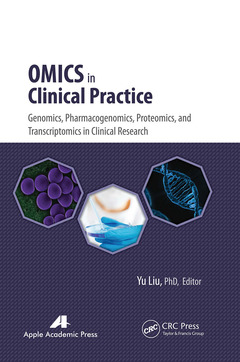Description
Omics in Clinical Practice
Genomics, Pharmacogenomics, Proteomics, and Transcriptomics in Clinical Research
Coordinator: Liu Yu
Language: English
Subjects for Omics in Clinical Practice:
Keywords
Biomarker Discovery; Te Ch; Sample Preparation; Clinical Practice; High Throughput Sequencing; Image Analysis; Infl Uenza; Ion Torrent PGM; Pharmacogenomic Biomarkers; HPV Type; Clinical Proteomics; HCMV Genome; Translational Medicine Research; Target Protein; Mitochondrial Proteome; Deep Sequencing; Viral Metagenomics; Method S1; Ge Ne; Coronavirus Genomes; Prion Diseases; Candidate Biomarker Discovery; CCR5 Antagonist; Immunogenic Proteins; FULL LENGTH VIRAL GENOME
Publication date: 03-2021
Support: Print on demand
Publication date: 06-2014
Support: Print on demand
Description
/li>Contents
/li>Biography
/li>
This title includes a number of Open Access chapters.
This book serves as an introduction to genomics, proteomics, and transcriptomics, putting these fields in relation to human disease and ailments. The various chapters consider the role of translation and personalized medicine, as well as pathogen detection, evolution, and infection, in relation to genomics, proteomics, and transcriptomics. The topic of companion diagnostics is also covered.
The book is broken into five sections. Part I examines the connection between omics and human disease. Part II looks at the applications for the fields of translational and personalized medicine. Part III focuses on molecular and genetic markers. Part IV describes the use of omics while studying pathogens, and Part V examines the applications for companion diagnostics.
The book:
? Introduces genomics, proteomics, and transcriptomics in relation to human disease and ailments
? Considers the role of translation and personalized medicine in relation to genomics, proteomics, and transcriptomics
? Covers molecular and genetic markers
? Considers the role of genomics, proteomics, and transcriptomics in relation to pathogen detection, evolution, and infection
? Covers companion diagnostics in relation to genomics, proteomics, and transcriptomics clinical applications and research
Introduction. Part 1: Omics and Human Disease. Comparative Mitochondrial Proteomics: Perspective in Human Diseases. Studies of Complex Biological Systems with Applications to Molecular Medicine: The Need to Integrate Transcriptomic and Proteomic Approaches. Next Generation Sequencing in Cancer Research and Clinical Application. Scientific Challenges and Implementation Barriers to Translation of Pharmacogenomics in Clinical Practice. Part 2: Translational and Personalized Medicine. Clinical Proteomics and Omics Clues Useful in Translational Medicine Research. Genomes2Drugs: Identifies Target Proteins and Lead Drugs from Proteome Data. Part 3: Molecular and Genetic Markers. Pitfalls and Limitations in Translation from Biomarker Discovery to Clinical Utility in Predictive and Personalised Medicine. How Bioinformatics Influences Health Informatics: Usage of Biomolecular Sequences, Expression Profiles and Automated Microscopic Image Analyses for Clinical Needs and Public Health. Application of "Omics" to Prion Biomarker Discovery. Part 4: Omics and Pathogens. Insights from Genomics into Bacterial Pathogen Populations. High Throughput Sequencing and Proteomics to Identify Immunogenic Proteins of a New Pathogen: The Dirty Genome Approach. Coronavirus Genomics and Bioinformatics Analysis. Part 5: Companion Diagnostics. Applications of Next-Generation Sequencing Technologies to Diagnostic Virology.Mass Spectrometry-Based Proteomics in Molecular Diagnostics: Discovery of Cancer Biomarkers Using Tissue Culture. Index.
Dr. Yu Liu is a bioinformatician with special interest in next-gen sequencing and its applications. His specialties are molecular biology, DNA sequence analysis, next-gen sequencing application on gene expression analysis and comparative genomics, and microarray gene expression analysis. He is the director of the Bioinformatics Resource Center at the University of Wisconsin-Madison. He has a master's degree in computer science from the University of Wisconsin-Madison; a master's degree in developmental biology from the Chinese Academy of Science; and PhD in molecular biology from The Ohio State University.




